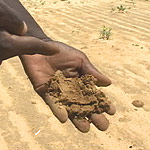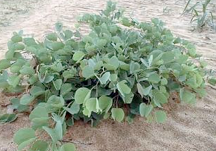August 3 is a special day in the West African nation of Niger. It is Independence Day, when, in 1960, the country changed from being a French colony to a fully independent nation. But it is also Arbor Day, the day of the year on which every Niger citizen is expected to plant a tree—to fight desertification.
The simultaneous celebration of independence and tree planting is no accident. Niger is one of the poorest countries on earth, partly because of the invasion of desert into former crop and forestland. Droughts have driven much desertification, but so have the practices of rural people. Needing firewood, they often cut shrubs, trees and sprouts from stumps. With each passing year, forests were farther away and desert was coming closer. So, in 1975, the Niger government assigned Arbor Day—a day of national tree-planting—to the same day as their independence. Trees, they reasoned, were an essential part of their future. As the mayor of one community said, “We will not let the wind blow us away.”

The results have been spectacular, partly due to the work of Tony Rinaudo, an Australian agriculturist working for the non-profit group World Vision. Rinaudo was working in Niger in 1983, depressed by the worsening conditions and the lack of progress to improve food supply. As he looked across a mostly barren field, he detected an occasional sprout. “In every direction there were no trees. But then these shrubs caught my eye, and I suddenly realized that this wasn’t a shrub but a tree trying to regrow.” He calls this the “underground forest,” stumps with living roots that are able to re-sprout and grow. He and his colleagues created a program called Farmer Managed Natural Regeneration (FMNR) that taught and encouraged farmers to protect these sprouts as future trees. Since then, more than 200 million trees have returned on more than 12 million acres.

Aerial photographs from 1975 to today show an enormous expansion in the numbers and density of trees growing in Niger. Chris Reij, from the World Resources Institute, who has worked in the region for decades, called this “probably the largest positive environmental transformation in the Sahel and perhaps in all of Africa.” According to the FMNR website, along with the increase in trees and tree cover have come many benefits—ground-water levels are rising in wells; soil erosion is down and quality is up; more firewood is available, locally and sustainably; crop yields of grain are up by 500,000 tons; a hectare of farm land produces $56 more income per year; and 2.5 million people are living a higher quality of life.
References:
AnydayGuide. Arbor Day in Niger. Available at: https://anydayguide.com/calendar/2073. Accessed August 3, 2017.
DW Akademie. 2010. Niger: Fighting the battle against desertification. Available at: http://www.dw.com/en/niger-fighting-the-battle-against-desertification/a-4475725. Accessed August 3, 2017.
